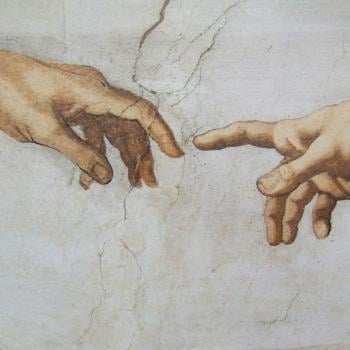
We are not to follow Jesus, and use Jesus, for the sake of personal gain or profit, that is, we are not to turn the Christian faith into a mere business opportunity. Sadly, it seems, this has been a problem for a long time. People see an opportunity to profit off of the faith of others. This is why we can see St. Antony the Great write against this tendency in his letters, such as when he said: “But those who do business in the name of Jesus, and do the will of their heart and their flesh – over such I lament.”[1]
This, it can be, was doubly important to the monks he was writing to, as such monks were expected to have given up all such worldly cares and concerns. Monasticism, indeed, developed, in part, as a response to the way Christianity was becoming appropriated and abused. The rising status of the Christian faith, even before Rome officially recognized its right to exist, meant many people found called to join in and engage Christianity for all the wrong reasons. They saw it as just another worldly institution which they could use for their own private gain. But, despite the way monasticism can be seen as a response to this, it did not take long for others to see monasticism as another tool, another way to gain notoriety and all the power and authority such notoriety could give. Which is why, even during the life of St. Antony, Antony felt he had to remind the monks in his charge this was far from the spirit they, let alone Christians, should embrace in their engagement of the Christian faith.
We are to follow Jesus, not for the sake of worldly, earthly gain for ourselves, especially if such gain comes at the expense of others, but for the sake of our own transformation, to be made better, recognizing that such a pursuit should also include and connect us with a desire to transform the world and make it better. That is, we are not to deny the good of the world, for if we did, it would be difficult for us to find how all things in it can and will be drawn together, united as one, and elevated in Christ. Thus, all of us, whether or not we are called to the religious life, are called to make sure we follow Christ for the right reasons. We should not try to completely cut ourselves off from the world, seeking perfection independent from the common good, because if we did that, we would continue the divisions sin brought into the world, the divisions which Christ wants us to overcome so that we can find ourselves in a proper, healthy relationship with each other: “And by the word of His power he gathered us out of all lands, from one end of the world to the other end of the world, and raised up our hearts from the earth, and taught us that we are members of one another.” [2] Such a relationship is lost when we think only of ourselves.
We have a long spiritual journey lying before us. When we first encounter Jesus, we are not perfect. Jesus doesn’t come expecting such perfection, because, without grace, without our encounter with him and the transformation he brings to us, we will not be able to attain such perfection.[3]
We are called to do what we deem is that, that is, what our conscience directs us to do. Sadly, we often find, even when we want to do such good, and to perfect ourselves by doing so, we are not able to do so. Knowing what is good, what should be done, does not in itself gives us what we need to do that good. There is a weakness within us which hinders our potential, and once we recognize that weakness, we know we need some external help to rise up and become the persons we want to be. That is, we need grace, the grace shared to the world by Christ. We are called to do what we can, but also, to let grace help us and perfect us, which means, grace alone doesn’t just perfect us, as if we are going to be forced to become perfect. Grace works when we cooperate with it. And, grace does so in a process, that is, by opening ourselves up to grace, we should not expect ourselves to become immediately perfect. Thus, our early encounters with Jesus will not likely have us instantly overcome the bad habits we have formed in our lives. He comes into our life in a variety of possible ways, and in each of them, he is working with us, helping us to develop and become better, to overcome the bad habits and ignorance which we once had, and in the process, we find ourselves not only being healed of all the pain and sorrow we have experienced, we also find ourselves working to help others, healing them from all the hurt we have caused them. Jesus comes to us with patience and love, helping us to overcome all our imperfections “The advent of Jesus helps us to do what is good, until we have destroyed all our vices.”[4] Indeed, Jesus comes to us as a physician, healing us from the wound of sin, and as healing often takes time, so Jesus takes his time with us, constantly showing us more of his love as we find more ways he is at work in our lives, healing us from our spiritual infirmities. When, at last, grace has perfected us, we will find ourselves able to have a true, loving communion with each other.
Salvation history shows that God has always been at work with humanity, often sending messengers and helpers to the world, messengers who would direct us to the grace which they themselves received in one fashion or another:
As the Creator saw that their wound was grown great, and needed the care of a physician – and Jesus himself is their Creator, and Himself heals them –and He sent forerunners before His face. And we are not afraid to say of Moses the Lawgiver that he is one of His forerunners, and that the same Spirit which was with Moses worked also in the choir of the saints; and they all prayed for the Only-begotten Son of God.[5]
This is why the teaching of the communion of saints is important. We can learn much from it. For the communion of saints shows us we are not called to be individuals apart from everyone else. Rather, we are to join with others in loving communion. When we do so, we will be concerned not only about our own welfare and salvation, our own private gain, but the good of all the world, just as the saints who came before us now look on our behalf and do what they can for us.
[1] St. Antony the Great, The Letters of Saint Antony the Great. Trans. Derwas J. Chitty (Fairacres, Oxford: SLG Press, 1991), 10 [Letter 3].
[2] St. Antony the Great, The Letters of Saint Antony the Great, 10 [Letter 3].
[3] Such an encounter can come in many ways, which is why Christians, like St. Justin Martyr, affirmed many had people a relation with him through his identity as the Logos. Thus, Justin said those who followed the prompting of the Logos in their lives could be said to be Christians, especially if they lived before the birth of Christ. Similarly, it can be said, many others, such as those in lands in which the historical narrative of the Gospel was not able to be heard, can come to Jesus and saving grace in this fashion.
[4] St. Antony the Great, The Letters of Saint Antony the Great, 10 [Letter 3].
[5] St. Antony the Great, The Letters of Saint Antony the Great, 9 [Letter 3].
Stay in touch! Like A Little Bit of Nothing on Facebook.
If you liked what you read, please consider sharing it with your friends and family!
N.B.: While I read comments to moderate them, I rarely respond to them. If I don’t respond to your comment directly, don’t assume I am unthankful for it. I appreciate it. But I want readers to feel free to ask questions, and hopefully, dialogue with each other. I have shared what I wanted to say, though some responses will get a brief reply by me, or, if I find it interesting and something I can engage fully, as the foundation for another post. I have had many posts inspired or improved upon thanks to my readers.













